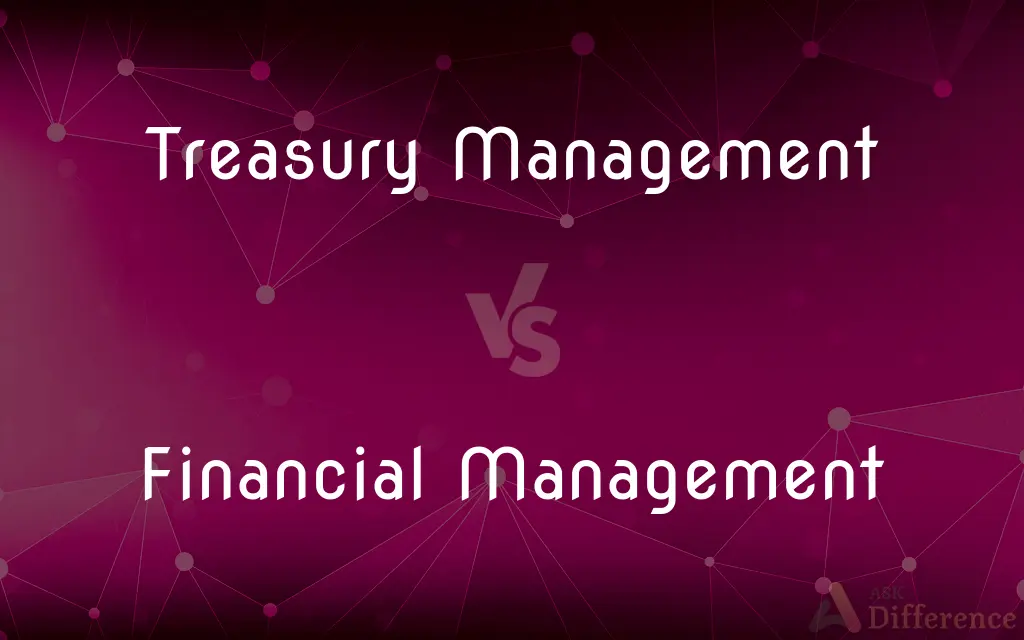Treasury Management vs. Financial Management — What's the Difference?
By Tayyaba Rehman — Published on October 28, 2023
Treasury Management deals with handling cash and financial assets to ensure liquidity. Financial Management encompasses planning, organizing, and controlling a company's financial resources.

Difference Between Treasury Management and Financial Management
Table of Contents
ADVERTISEMENT
Key Differences
Treasury Management specializes in managing an organization's money, ensuring there's enough liquidity to meet short-term obligations. In contrast, Financial Management provides a broader framework, covering the entire financial health and strategy of a company.
While Treasury Management hones in on daily cash flow, handling short-term investments, and mitigating financial risks, Financial Management delves deeper into financial planning, asset allocation, and the strategic allocation of resources for long-term growth.
Think of Treasury Management as a subset of Financial Management. Its core is about safeguarding a firm's liquidity, managing currency risks, and optimizing cash resources. Financial Management, meanwhile, evaluates investments, determines financing methods, and sets financial goals and budgets.
An efficient Treasury Management system ensures that a company can seamlessly conduct its daily financial activities. Financial Management, on the other hand, ensures that these daily activities align with the company's long-term financial objectives.
In essence, while both Treasury Management and Financial Management aim to strengthen a firm's financial position, their scope, focus, and methods differ considerably.
ADVERTISEMENT
Comparison Chart
Main Focus
Liquidity and cash flow management
Overall financial strategy and resource allocation
Scope
Short-term financial activities
Comprehensive financial activities
Core Activities
Cash management, risk mitigation
Financial planning, asset allocation, budgeting
Objective
Ensure liquidity and optimize cash resources
Achieve long-term financial objectives and growth
Relation
Subset of financial management
Broader discipline encompassing treasury management
Compare with Definitions
Treasury Management
Treasury Management is the strategic handling of financial risks and assets to optimize liquidity.
Treasury Management played a crucial role during the economic downturn, preserving the company's cash position.
Financial Management
Financial Management is the systematic planning and handling of a company's financial resources.
Proper Financial Management ensured the startup's sustainability and growth.
Treasury Management
Treasury Management centers on safeguarding and optimizing a firm's cash and liquid assets.
Thanks to robust Treasury Management, the organization never faced cash shortages.
Financial Management
Financial Management is about making informed decisions concerning investments, financing, and dividends.
Through Financial Management, the firm optimized its investment portfolio.
Treasury Management
Treasury Management emphasizes efficient cash flow, risk mitigation, and short-term investments.
Through Treasury Management, the corporation ensured steady returns from its short-term investments.
Financial Management
Financial Management seeks to maximize shareholder value through judicious financial decisions.
Financial Management strategies propelled the company to higher stock market valuations.
Treasury Management
Treasury Management involves managing an organization's liquidity and short-term financial operations.
With adept Treasury Management, the firm efficiently handled its daily cash flows.
Financial Management
Financial Management covers budgeting, forecasting, and overall financial strategy formulation.
Financial Management was key in navigating the company through economic challenges.
Treasury Management
Treasury Management is the oversight of cash, currency, and financial assets.
Effective Treasury Management ensures that the company can meet its immediate financial obligations.
Financial Management
Financial Management involves the strategic allocation of monetary resources to achieve organizational objectives.
The CEO emphasized the role of Financial Management in the company's expansion plans.
Common Curiosities
What is the main objective of Financial Management?
Financial Management aims to strategically allocate resources to achieve long-term financial objectives and growth.
How does Treasury Management relate to Financial Management?
Treasury Management is a subset of Financial Management, focusing specifically on short-term financial activities.
What is a core task of Treasury Management?
A core task is managing daily cash flow and ensuring the company has enough liquidity to meet short-term obligations.
What does Treasury Management entail?
Treasury Management handles cash and financial assets to ensure liquidity and mitigate financial risks.
How does Financial Management benefit investors?
It seeks to maximize shareholder value through prudent financial decisions and strategies.
Why is Financial Management vital for companies?
Financial Management ensures companies make informed financial decisions that align with their long-term goals.
Does Treasury Management influence a company's profitability?
While it primarily focuses on liquidity, efficient Treasury Management can optimize short-term investments, indirectly affecting profitability.
How do budgets relate to Financial Management?
Budgets are a crucial component, helping organizations plan and control their financial resources in alignment with their goals.
What tools aid in effective Treasury Management?
Tools include cash flow forecasting, electronic funds transfer systems, and risk management software.
Is risk management part of Treasury Management?
Yes, Treasury Management involves mitigating financial risks, especially related to liquidity and currency fluctuations.
Can a company have good Financial Management but poor Treasury Management?
Yes, a company might have a solid long-term financial strategy but struggle with daily liquidity and cash flow issues.
Why is Financial Management essential for startups?
It ensures startups allocate resources wisely, maintain sustainability, and position themselves for growth.
How do interest rates impact Treasury Management?
Interest rates can affect the return on short-term investments and the cost of short-term borrowing, directly influencing Treasury Management activities.
Can a company outsource its Financial Management?
While certain functions can be outsourced, strategic financial decision-making is typically retained in-house.
How do global operations affect Treasury Management?
Global operations introduce complexities like currency risk, which Treasury Management must navigate to safeguard the company's financial position.
Share Your Discovery

Previous Comparison
Vendor vs. Customer
Next Comparison
Cream Cheese vs. Cream Cheese SpreadAuthor Spotlight
Written by
Tayyaba RehmanTayyaba Rehman is a distinguished writer, currently serving as a primary contributor to askdifference.com. As a researcher in semantics and etymology, Tayyaba's passion for the complexity of languages and their distinctions has found a perfect home on the platform. Tayyaba delves into the intricacies of language, distinguishing between commonly confused words and phrases, thereby providing clarity for readers worldwide.
















































